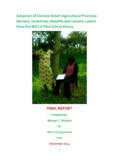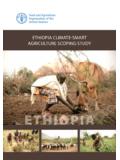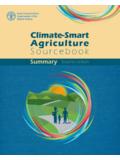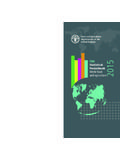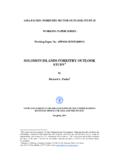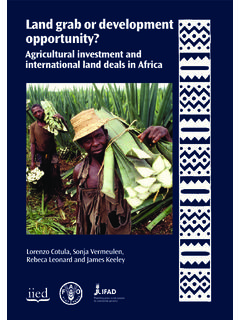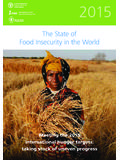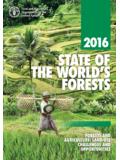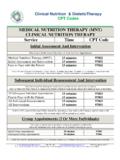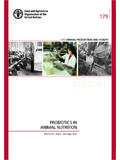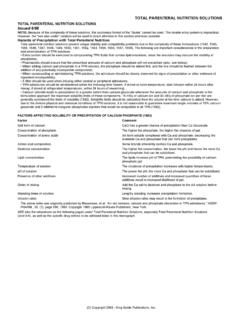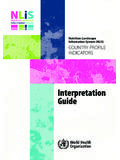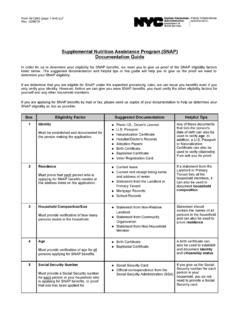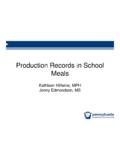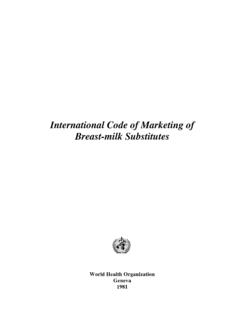Transcription of Nutrition and food systems
1 HLPE. REPORT 12. Nutrition and food systems A report by The High Level Panel of Experts on food Security and Nutrition September 2017. HLPE. High Level Panel of Experts HLPE Reports series #1 Price volatility and food security (2011). #2 Land tenure and international investments in agriculture (2011). #3 food security and climate change (2012). #4 Social protection for food security (2012). #5 Biofuels and food security (2013). #6 Investing in smallholder agriculture for food security (2013). #7 Sustainable fisheries and aquaculture for food security and Nutrition (2014). #8 food losses and waste in the context of sustainable food systems (2014).
2 #9 Water for food security and Nutrition (2015). #10 Sustainable agricultural development for food security and Nutrition : what roles for livestock? (2016). #11 Sustainable forestry for food security and Nutrition (2017). #12 Nutrition and food systems (2017). All HLPE reports are available at 2. HLPE Steering Committee members (September 2017). Patrick Caron (Chair). Carol Kalafatic (Vice-Chair). Amadou Allahoury Louise Fresco Eileen Kennedy Muhammad Azeem Khan Bernardo Kliksberg Fangquan Mei Sophia Murphy Mohammad Saeid Noori Naeini Michel Pimbert Juan ngel Rivera Dommarco Magdalena Sep lveda Martin Yemefack Rami Zurayk HLPE Project Team members Jessica Fanzo (Team Leader).
3 Mandana Arabi Barbara Burlingame Lawrence Haddad Simon Kimenju Gregory Miller Fengying Nie Elisabetta Recine Llu s Serra-Majem Dipa Sinha Coordinator of the HLPE. Nathana l Pingault This report by the High Level Panel of Experts on food Security and Nutrition (HLPE) has been approved by the HLPE Steering Committee. The views expressed do not necessarily reflect the official views of the Committee on World food Security, of its members, participants, or of the Secretariat. The mention of specific companies or products of manufacturers, whether or not these have been patented, does not imply that these have been endorsed or recommended by the HLPE in preference to others of a similar nature that are not mentioned.
4 This report is made publicly available and its reproduction and dissemination is encouraged. Non-commercial uses will be authorized free of charge, upon request. Reproduction for resale or other commercial purposes, including educational purposes, may incur fees. Applications for permission to reproduce or disseminate this report should be addressed by e-mail to with copy to Referencing this report: HLPE. 2017. Nutrition and food systems . A report by the High Level Panel of Experts on food Security and Nutrition of the Committee on World food Security, Rome. 3. Contents Foreword .. 9. Summary and Recommendations .. 11. Summary.
5 11. Recommendations .. 17. Introduction .. 21. 1 Setting the stage: approach and conceptual framework .. 23. Definitions and overview of the conceptual framework .. 23. The constituent elements of food systems .. 24. food supply chains .. 24. food environments .. 28. Consumer 31. Diets .. 32. Healthy and sustainable diets .. 32. The Nutrition , health, environmental, economic and social outcomes of diets .. 34. A food system typology .. 35. Traditional food systems .. 38. Mixed food systems .. 39. Modern food 40. Conclusion .. 41. 2 The multiple burdens of malnutrition .. 43. The current burdens of malnutrition .. 43. Malnutrition: situation and trends.
6 44. Malnutrition: regional patterns .. 46. Vulnerability to malnutrition .. 48. The consequences of malnutrition .. 50. Health consequences .. 50. Economic and social consequences .. 52. Nutrition outcomes across food system types .. 53. Conclusion .. 54. 3 Diets in transition .. 55. Changing diets .. 55. Current food consumption trends and dietary patterns .. 55. Shifts in dietary patterns: the Nutrition transition .. 58. Projected future dietary trends and sustainability .. 60. Diets of vulnerable groups .. 61. Territorial influence of diets .. 64. 4. The role of income on diets .. 65. Conclusion .. 66. 4 Drivers of food system 67.
7 Biophysical and environmental drivers .. 67. Natural resources and ecosystem services .. 67. Climate change .. 69. Innovation, technology and infrastructure drivers .. 70. Innovation and technology .. 70. Infrastructure .. 71. Political and economic drivers .. 72. Leadership .. 72. Globalization and trade .. 72. food , agriculture and Nutrition policies .. 73. food prices and volatility .. 75. Land tenure .. 75. Conflicts and humanitarian crises .. 76. Socio-cultural drivers .. 78. Cultures, rituals and social traditions .. 78. Women's empowerment .. 79. Demographic drivers .. 80. Population growth and changing age distribution.
8 80. Urbanization .. 80. Migration and forced displacement .. 81. Conclusion .. 81. 5 Positive directions for food systems , diets and 83. Priorities for action in food supply chains .. 83. Production 83. Storage and distribution .. 88. Processing and packaging .. 89. Retail and markets .. 91. Evidence gaps in the food supply chain .. 92. Key points of interventions across food supply chains .. 93. Priorities for action in food environments .. 94. Physical access (proximity) .. 94. Economic access (affordability) .. 95. Promotion, advertising and information .. 97. food quality and safety .. 99. Evidence gaps for the food environment.
9 100. Key points of interventions across food environments .. 100. Priorities for orienting consumer behaviour towards healthier 102. Nutrition education .. 102. food acceptability .. 104. Social norms and traditions .. 105. 5. Evidence gaps in consumer behaviour .. 106. Key points of interventions to orient consumer behaviour .. 106. Investment and intervention priorities across food system types .. 108. Traditional food systems .. 109. Mixed food systems .. 109. Modern food 109. Conclusion .. 109. 6 Translating evidence into action .. 111. Motivations for action .. 111. Barriers and obstacles that prevent action .. 112. Failure to recognize the right to adequate food .
10 112. Power imbalances across food 112. Conflicts of interest .. 113. Enabling conditions to improve Nutrition and food systems .. 114. Build a supportive political environment .. 114. Invest in Nutrition and food systems .. 116. Develop human capacity across Nutrition and food 116. Support movements, coalitions and networks .. 117. Develop new partnerships .. 118. Conclusions and key messages .. 118. Conclusion .. 119. Acknowledgements .. 120. References .. 121. Appendix .. 150. The HLPE project cycle .. 150. 6. List of Figures Figure 1 Conceptual framework of food systems for diets and Nutrition .. 26. Figure 2 Proportion of household budgets spent on food in different countries (2015).


